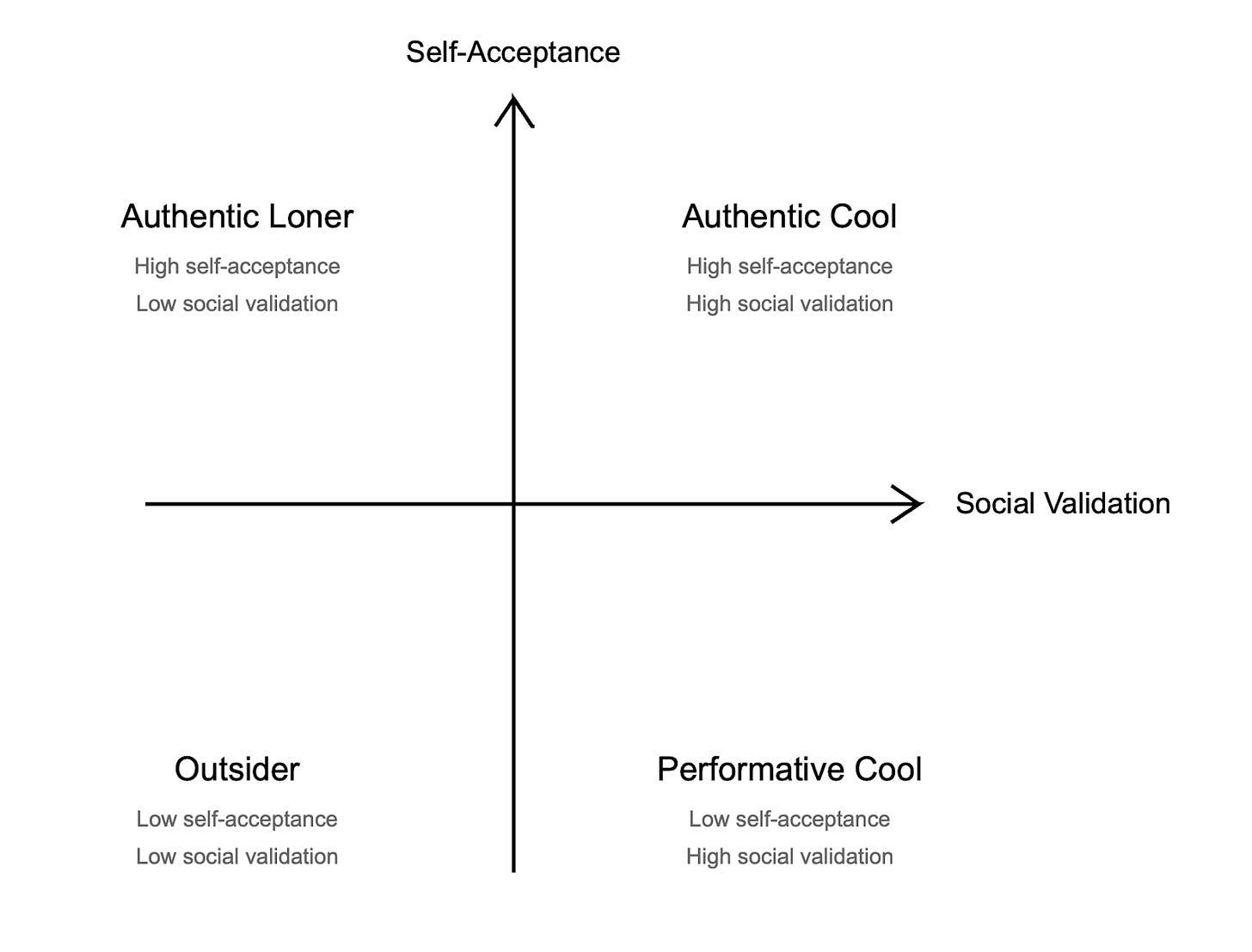This is the second post in a two-part series by Ram and Chiara.
In part 1, Ram described how our perception of coolness evolves throughout our adolescence. Our perception of coolness is very alive - and very elastic. It stretches, mutates, and pieced together until, ideally, we reach a point where we realize that being cool actually just means reflecting as much of our inner selves as possible.
In a nutshell, the “post-adolescent perception of coolness” that Ram refers to is that coolness serves as a proxy for authenticity.
Coolness as a Proxy for Authenticity
TLDR: Coolness is a judgment that acts as a filter for finding our tribe. But it only really works if you’re authentic.
Try-hards are obvious
People we find cool tend to be people whose interests align with ours, whose vibe we appreciate and want more of in our lives, or whose traits we admire, or whose approaches to making sense of the world enrich ours.
Someone who dresses a certain way, who likes a certain kind of music, and who can nerd out about the best underground venues to listen to that kind of music might be deemed extremely cool within some social circles… or incredibly pretentious within others.
But what’s the difference?
You could connect with someone over techno as a subject matter, or even over the pastime of finding the best underground clubs to listen to emerging techno artists. It’s great to find someone with similar interests to yours. You internally label that person “cool” because you share an appreciation for this genre of music or hobby.
It stops being cool when someone is trying too hard to show you that they’re into techno because they think it’ll impress you. It stops being cool when they think that others will find them cool if they name-drop all the famous techno DJs they know on a first-name basis. As soon as they’re sharing this information to gain status or coolness points - as an instrument to getting you to like them - it’s just a bit of an ick.
What’s great about this is that it’s pretty easy to tell when someone is trying too hard to be cool. This means that being cool can serve as a proxy for being authentic. And authenticity is what will allow you to deeply and meaningfully connect with others, and thus filter for the people you really want in your life.
So sure, you might not enjoy techno. But despite this, you might appreciate someone whose eyes light up when talking about something they profoundly enjoy; who can express genuine excitement about a topic that had thrust them into the depths of Wikipedia; who loves to dive into the intricacies of a subject because they find it fascinating and want to share that with others.
This person is cool if they don’t need to use techno to prove anything about themselves to you. (And you can replace ‘techno’ with just about anything - any topic, interest, value or trait.) They don’t need your acceptance. They are who they are, they like what they like, and they’re not ashamed about that. They’re just vibing.
Self acceptance → authenticity → coolness
Self-acceptance is about not feeling compelled to hide or downplay parts of yourself to fit in. This goes for your interests - being comfortable with what you like and how you enjoy spending your time. But self-acceptance is also about who you are, what you think, how you interact with others, and how you move through the world.
Self-acceptance allows you to be authentic because you’ll be able to more easily and unashamedly share more of your inner world with others. This is because putting more of yourself out in the world will allow you to more easily filter for people who care about the same things you do, or who value the fact that you can engage openly with the world; or because people can put together a fuller picture of who you are. This will lead to more people finding you cool.
As Ram described, cool people are social magnets. But this is only sustainable in the long run if it comes from a place of realness.
This works at the group level, too! Groups that have authenticity built into their culture end up being perceived as cool because they can help each other pursue authentic coolness at the individual level.
Faking It vs. Making It
Coolness points at a bundle of traits or features that a specific individual or group deems desirable, interesting or important. That makes coolness a social construct. It isn’t based on any innate reality but on some (conscious or unconscious) agreement about what an individual or a group values.
That means being cool requires some social validation, because to be cool, someone else needs to label you cool.
Basically:
Authentic coolness happens when authenticity is recognised, validated and appreciated socially. This stems from being deeply comfortable with oneself, i.e. being at ease with your interests and passions, even if they don’t conventionally fit with those of others. This comfort with oneself isn’t the same as not caring about what others think. It's more about having enough self-acceptance to be present and engage freely, without constantly monitoring and adjusting oneself.
Some people can be authentically cool in some areas of their lives, but usually not in all. While we’d argue that pursuing authentic coolness in all areas of your life is ideal, it’s worth acknowledging that authentic coolness is not a steady state. It’s not a final destination. Rather, it’s a continuous process of checking for acceptance and genuine excitement within oneself.
Noticing when we’re being performatively cool can be useful to reflect on what’s holding us back from authenticity.
Performative coolness is about gaining social status from others, chasing recognition, validation and appreciation that comes with authentic coolness. Everyone can fall into this category sometimes, mostly when we want to impress others. I think this is the uncanny valley most adolescents find themselves in, seeking external validation without true self-acceptance, mainly because they’re trying to figure out who they are in the first place and what self-acceptance means in this context. It could even be endearing in small doses, like when a younger sibling looks up to you and really wants to connect with you.
Performative coolness may not always be intentional, and such instances are often easily overlooked. But it can also be downright calculating and initially perceived as authentic coolness. Eventually, though, I think people have a pretty good radar for this kind of behavior and will probably not want to engage much with it.
An authentic loner is someone comfortable with themselves (high self-acceptance) but not necessarily engaged socially, so is unlikely to be labelled by others as cool. I’d say this is a local optimum - an authentic loner might be internally content but miss out on the growth, support, and opportunities that could come from authentic connection with others (or might only find this connection from a few people under very specific circumstances).
An outsider doesn’t have much self-acceptance or much social validation. This is a tricky basin to crawl out of because this person is probably going through some real sh*t. Ideally, they prioritize self-acceptance and move into the authentic loner field before making their way into the authentic cool quadrant.
(I’m not sold on these labels being exactly the right ones for this matrix, and I think I’m least sold on the outsider quadrant as a whole, but we’re not letting perfect be the enemy of good, so we’ll run with it for now.)
A big problem is that high social validation can reinforce both performative coolness as well as authentic coolness. And while I think people naturally spot and filter out those who are performatively cool, I think there are other ways to learn what it means to be authentically cool. For example:
Exposure to different social groups: Because there's no single universal definition of coolness, exposure to lots of different social groups can lead to a better understanding of the types of people and social contexts that are most enjoyable for you; that feel good to be in; that bring out the best in us. A lot of performatively cool people in high school have a much harder time in university because there’s a much bigger and more diverse pool of people to engage with. The algorithm for being considered cool becomes way more complex, and they often don’t have the practice.
Fall-outs, arguments, negative social interactions: Here I’m thinking about close relationships where performative behavior becomes exhausting to you or your counterpart, thus causing some rift that forces you to wrangle with your own unappealing behavior if you want to (re)build better relationships. Things like friend break-ups or being ousted from some social group can fall into this category.
Role models: People who are widely respected for being themselves show us that it’s possible to be authentically cool and that it’s within reach. While fame can be a confounder, I intuitively want to say that there are people who have achieved fame this way. (I struggle to think of an example, so I turned to my trusty friend Claude, who suggests Greta Thunberg: “Her unwavering commitment to climate activism despite criticism demonstrates refusing to compromise her authentic concerns to be more palatable.”)
Self-discovery: While social groups ultimately determine your perceived coolness, the journey to authenticity requires some solo work. Deliberate introspection develops your self-understanding and values. Meditation, journaling and therapy are among some of the more common ways of doing this. This internal clarity equips you with a stronger foundation when you re-engage socially, making it easier to maintain your authentic self rather than trying to match the expectations of others. That said, this kind of internal work is massively accelerated with a select few who can support you in making sense of yourself and help you spot patterns over time. Very few of us can do anything alone.
Why analyze coolness at all?
Authenticity is a hard and vague goal. It’s a feeling more than anything else. Partly, people need to find personal ways of measuring their authenticity, but signals from the social world can be useful, too. Very few people describe each other as authentic though, so social signals here are hard to attain. While coolness is also pretty vague and worth taking apart, it does seem way more common to call people cool. If we can break down what coolness is pointing at, we can figure out how to integrate it into our understanding of ourselves and the world around us.
The idea of coolness as a proxy for authenticity is interesting to us because of the ripple effect: authentic behaviour can encourage others to be more authentic, too. And ultimately, authenticity leads to better relationships among people in a collective.
By cultivating stronger bonds between people, you create the basis for more creative collaboration and experimentation. When more people are more authentic, interactions become more open and genuine than the polite, arms-length societal default. This creates the psychological safety to share more feelings and ideas with one another. Which, in turn, cultivates better self-understanding and sense-making.
I see this as one of the key ingredients for how more people can achieve more of what they want to achieve and feel more fulfilled in their lives.
So, is being cool important? Yes. Being cool can be a proxy for being authentic. It’s not perfect, but we think it works pretty well. We should all think about how to be more cool, and how we want to be cool.
Read part 1 here:





How much of coolness and authenticity is in the eye of the beholder? I feel like this guy thinks he’s nailing the coolness, while my cringe radar is going crazy.
https://www.instagram.com/reel/DJ2ukbjyz4F/?igsh=ZHdiZWZrY2ozd3Zk
As a signal to oneself to notice when and where authenticity is still not achieved, I like to reflect on how self-conscious I felt in various situations. Did I act out? Did I want to impress? Was I fully myself, or was I trying to achieve something? Was I obsessing over stuff I said and what people would think of me as a result?
Your framing as a continuous quest is useful to me in that context, as it validates that I might have achieved authenticity in some places, and need to work on it in others. Then the question becomes: where am I feeling insecure, and why?